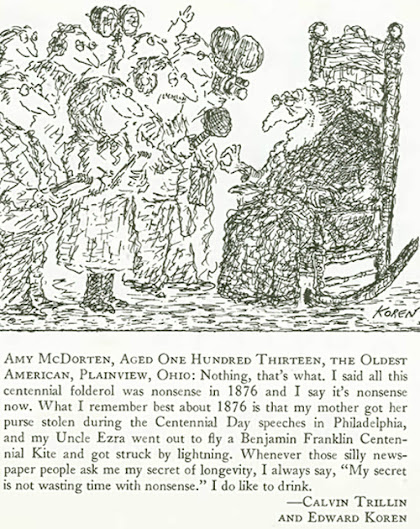
"There are some words I will not tolerate in
this house -- and 'awesome' is one of them."
this house -- and 'awesome' is one of them."
by Ken
The other day I was contemplating joining the throng seeking frantically to slap down 150 smackers to secure one of the precious 40 slots on Calvin Trillin's annual Village-to-Chinatown eating tour, offered as part of the New Yorker Festival. I explained that part of my hesitation is the expectation of "making a tongue-tied gibbering idiot of myself in the presence of my idol." (There was also a bit of follow-up about the event here.)
Now of course, when you're part of a tour group of 40 (mostly) pushy New Yorkers, you don't have to worry about embarrassing contact with the tour leader, since you're not likely to have any contact with the tour leader unless you're, you know, one of those pushy New Yorkers. Still, I would want to have contact, to try to express to Trillin how much his writing has meant to me.
The "tongue-tied gibbering idiot" part may have sounded hyper-self-critical, not to mention theoretical. Not so, I say, and I want to offer anecdotal evidence.
Many years ago -- I think we could say "decades ago," in fact -- I had occasion to be introduced to the great New Yorker cartoonisht Ed Koren. Now I can't say I feel toward Koren quite the same reverence I do for Trillin, but there's a lot of awe stored up. What's more, I knew at the time that Koren and Trillin were friends, and had in fact collaborated on an occasional series of pieces for The New Yorker called "The Inquiring Demographer," their take on "man in the street" Q-and-A features in which they created people to answer harmless or dope questions, with Koren providing images and Trillin providing text, of course.
I loved "The Inquiring Demographer." And at the time of my "great encounter" with Ed Koren, it must have been a few years since he and Trillin had done an "Inquiring Demographer." I was genuinely concerned that, not having clipped and saved the pieces as they appeared, they would be lost to me forever. Hence the question I asked: Into whose books would the "Inquiring Demographer" pieces go, his or Trillin's.
He seemed like a very nice and very shy person. While giving me the sort of look that says, "This person is clearly unbalanced but I can't determine yet whether he's dangerous," he said something about those pieces just being something the two of them had cranked out, or words to that effect, and that nobody would be interested in them now.
At that point I had the sense and decency to leave the man alone. But I wanted those pieces in book form then, and I'd love to have them now.
Just to give you some idea of what I'm talking about, I did an online search for "The Inquiring Demographer," and actually found a link. I didn't even look beyond it to see if other links had appeared; I just checked this one out, and sure enough found myself eyeballing an actual "Inquiring Demographer piece. It's not one of the best, and I apologize for the technical limitations of what I'm presenting here, but at least this will give you some idea of what I'm talking about.

THIS WEEK'S QUESTION: WHAT ARE YOU
DOING TO CELEBRATE THE BICENTENNIAL?
DOING TO CELEBRATE THE BICENTENNIAL?
Also heard from:WHAT HAPPENED TO THE NEW YORKER WEB INDEX?
WAYNE JONES, JR., Chairman, Black Students Association, East Oakland Community College
TALIAFERRO BARNSDALE, Bicentennial Committee Chairman, Priors, Virginia
ROBERT T. MACKINTOSH, Robmac Enterprises, Mineola, Long Island
[Click to enlarge.]
When I decided to go in search of "The Inquiring Demographer," it occurred to that there's now a resource that didn't exist the last time I went searching: the magazine's Web archive. Or at least it used to exist. As some readers may be aware from my incessant whining, I've had quite a lot of difficulty logging onto the New Yorker website since it went back behind a new paywall.
Well, by jockeying the browsers I use, I've managed to get kind of shaky access -- and was even able to log into the Archive. But as far as I can tell, the spectacular search function that used to be there is gone, and all it seems you can do now is "browse issues." If you happen to know which issue you're looking for, you can browse it and probably find what you're looking for. If that capability still exists, I sure couldn't find it.
It used to be relatively easy to find most anything you thought might have been published in The New Yorker, and considering the range of what has been published in The New Yorker over its storied history, that was a treasure trove.
#





No comments:
Post a Comment